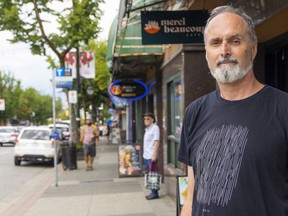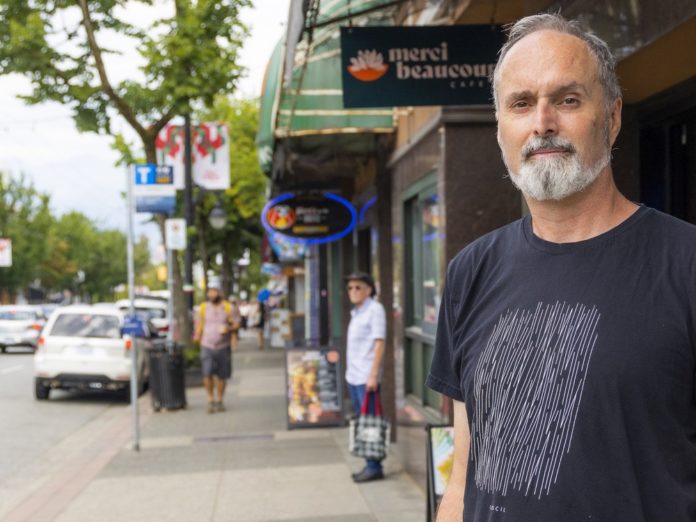Canadian Federation of Independent Business survey found up to 17 per cent had thoughts about closing their doors.

Article content
Darren Gay’s niche video-rental business had already become precarious by New Years 2020, but it was stable enough that he was thinking of ways to diversify Black Dog Video’s operations on Commercial Drive.
Advertisement 2
Story continues below
Article content
Instead, his business was crushed by a customer base that largely just stayed home during COVID-19 restrictions and haven’t returned in enough numbers to help with the rent increase he was hit with in January, rising insurance costs and increasingly expensive prices to stock inventory.
“Our last day was June 25,” Gay said of his decision to finally pull the plug, “because I knew that I needed, like, five days to get everything out of there.”
Gay isn’t alone. There are signs a sizeable number of B.C. businesses are still under stress with sales that haven’t matched pre-pandemic levels while their costs are rising, the Canadian Federation of Independent Business found in a recent survey.
Some 17 per cent of respondents admitted to considering winding up their operations, or even declaring bankruptcy.
Advertisement 3
Story continues below
Article content
“It’s just the accumulation of all these” things, said Annie Dormuth, the federation’s director of provincial affairs for B.C.
Businesses have COVID-19-related debts from federal assistance programs they can’t repay because revenues have been slow to recover, Dormuth said, higher government costs from increasing employment insurance and Canada pension plan payments, and rising rents.
Difficulties finding employees, skyrocketing shipping costs and supply chain disruptions that make it harder to stock shelves add to the difficulties in keeping doors open.
Nationally, the CFIB survey found that business bankruptcies have increased since mid 2021, but that only represents “the tip of the iceberg” of struggling businesses. Many would simply close their doors before needing to declare bankrupty.
Advertisement 4
Story continues below
Article content
Measures that government could adopt that would help include increasing the forgivable portion of Canada Emergency Business Account loans to 50 per cent, extending the repayment deadline to the end of 2024 and increasing the small-business tax deduction to $600,000 from $500,000.
Dormuth said, in B.C., the province could rebate some of the $3.4 billion surplus in WorkSafeBC coffers back to the businesses that paid into it.
The survey found that 51 per cent of B.C. businesses haven’t recovered to pre-pandemic revenue levels and 56 per cent still carried pandemic debts.
“Property taxes is a big one, as well they’re dealing with provincial costs (with) employer-paid sick days that came into effect this year,” Dormuth said.
Advertisement 5
Story continues below
Article content
Taxes are first thing Vancouver Coun. Sarah Kirby-Yung hears from business owners.
“Directly within civic responsibility, the No. 1 thing is keeping taxes reasonable,” Kirby-Yung said, for business taxpayers that occupy just 15 per cent of the land base but “pay the lion’s share of taxes.”
Her concern is that Vancouver has raised taxes almost 25 per cent, cumulatively, over the past four years, including pandemic years.
“That’s really significant. You are hitting business literally when they’re down with punitive increases that they can’t sustain,” Kirby-Yung said.
Kirby-Yung added that the city needs to be more nimble in adjusting regulations for businesses that want to pivot, such as allowing restaurants to add specialty grocery sales to premises as a way of diversifying, “o those businesses can adapt.”
Advertisement 6
Story continues below
Article content
But, “The regulation processes are typically restrictive and quite slow to change,” she said.
Other elements are beyond government control, such as backed-up supply chains, said Jane McFadden, executive director of the Kitsilano Fourth Avenue Business Improvement Area.
She pointed to the outdoor sports stores in her BIA that “had an epic ski season,” but had a hard time keeping snowboards and gear in stock. Similarly, stores couldn’t get bicycles during the boom in cycling that also came with the pandemic.
“Now it’s hit this peak and you can’t get another bike until, I think, 2023,” McFadden said, and “shipping goods from Asia, I think it’s doubled if not tripled” in cost.
Business owners typically don’t tip their hands about having difficulties, said Neil Wyles, executive director of the Mount Pleasant Business Improvement Association, but “for every business that you see vacant, there is a story.”
Sometimes, it is simply rents that have become too high, Wyles said. Other storefronts stay empty because landlords want six-month demolition clauses or businesses are waiting for renovation permits.
Gay hoped he might have had more time to adjust what was already a diminishing business in video rentals. For now, he’s kept Black Dog’s website active to sell remaining videos from his extensive collection.
“I would like to think that maybe we’d be doing something else in conjunction with rentals, it’s hard to say,” Gay said.








